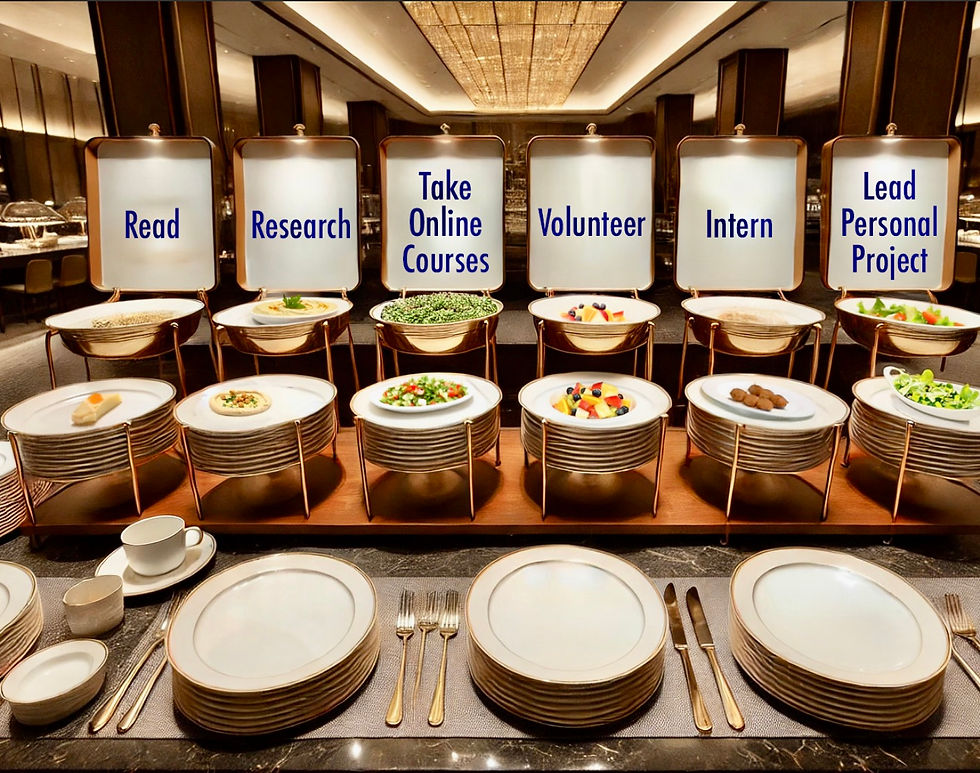Making the Most of Summer: Exploration Over Obligation
- ivyoptionswebsite
- Apr 2
- 3 min read

As summer approaches, students and parents feel pressured to fill summer schedules with prestigious programs, big-name internships, and extra academics. The assumption: more is always better. But the truth is, summer isn’t about doing everything—it’s about opting for carefully selected activities.
Recently, our Career Specialist Anna Manafova and Senior Advisor Laura Waft hosted a parent webinar with a fresh approach to summer planning. Instead of treating activities like a checklist, students should see summer options as a buffet: choosing experiences that excite them and help them grow. This approach not only strengthens a resume, but also fosters genuine curiosity, real-world skills, and confidence.
Exploration Over Obligation
Many students feel pressured to overload on summer activities, thinking this will impress universities. However, admissions officers care more about depth and contribution than quantity. A summer packed with disconnected activities won’t stand out—but focused, meaningful engagement will. Students should seek opportunities that expand knowledge, test career paths, and contribute to their communities. Whether diving into a subject they love, gaining hands-on experience, or giving back, the key is choosing experiences that matter, not just those that "look good."
Key Summer Activities and How to Choose the Right Mix
The most valuable summer activities fall under three categories: intellectual curiosity, community service, and hands-on exploration. A mix of these will help students stand out in admissions and determine what they hope to do in the future.
Intellectual Curiosity:
Reading is an easy but powerful way to spark curiosity. Fiction is great, but non-fiction helps students explore academic interests. A future entrepreneur might read about startups, while an aspiring doctor might dive into medical breakthroughs. Additionally, following current events in a favorite subject can provide insight into a potential college major or career path.
Research is perfect for students who want to test an interest, deepen knowledge, and prove initiative. Whether working independently, alongside a mentor, or through a formal program, students should choose topics that excite them. Instead of “life on a space station,” why not explore how astronauts protect themselves from radiation? A sharp, specific research question stands out.
Online Courses allow students to explore new subjects or get ahead in their studies. Platforms like Coursera, edX, and Udemy offer courses in business, coding, psychology, and more. The best strategy: pick courses that spark curiosity and develop real skills.
Community Service:
Volunteering helps colleges identify students who care about the world around them—not just those who log service hours. Long-term commitment beats short-term volunteering. An aspiring lawyer could help at a legal aid clinic, while a future scientist might work at an environmental NGO. The best service experiences arise from genuine interest. What issues matter to the student? What skills can they offer? The most impactful projects aren’t about prestige—they’re about making a real difference; even basic administrative tasks that lighten the load for others are valuable.
Hands-on Exploration:
Work Experiences help students test future career paths. Internships, part-time work, and freelancing all provide valuable exposure. If formal internships aren’t available, students can shadow professionals, start independent projects, or work remotely.
Personal Projects showcase initiative and creativity. Whether launching a blog, starting a business, designing an app, or writing a book, students should ask: What can I create? What problem can I solve? These projects often overlap with intellectual curiosity and community service, making them a powerful way to stand out.
A Purposeful Approach to Summer
Younger high school students should start small and explore activities, going deeper each summer. By 11th grade, they should focus on one or two key experiences that align with their future goals. Ultimately, summer should be about self-discovery, not stress. Students who stand out follow their curiosity, take initiative, and engage in experiences they truly enjoy.
For more information on our personalized summer planning guidance, one-on-one admissions counseling, or online Advantage IO courses, please contact info@ivyoptions.com.
Comments